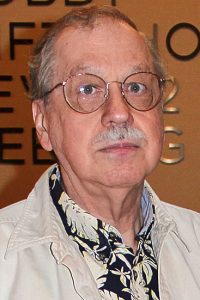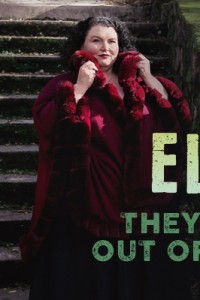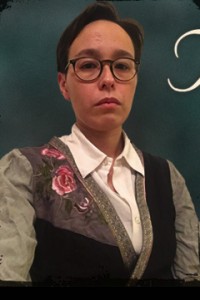Future Fiction Workshop
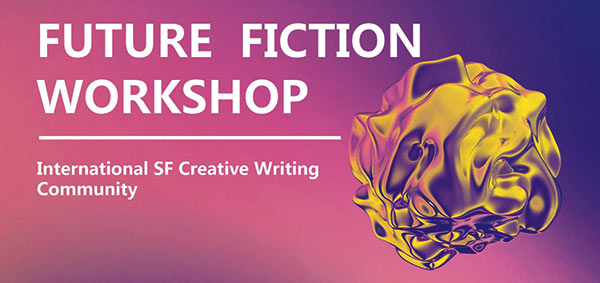
It takes true dreamers to make dreams happen. In the case of the Future Fiction Workshop held near Chongqing, China in June 2024, those were the intrepid Italian editor Francesco Verso and Fan Zhang, dean of the newly established Fishing Fortress Science Fiction College. Francesco, who has made World SF his life’s mission, has long worked in promoting science fiction into and out of China. Fan, who now supervises no less than four Chinese colleges dedicated to the teaching of science fiction, is equally passionate. Their plan, hatched sometime in 2019, was foiled in part by the coronavirus pandemic, but the two surmounted this and all other obstacles to bring together a whole host of Chinese and international SF writers, editors, teachers and students together for one intensive week at the little college town of Qijiang.

Twenty-five bright new writers, drawn partly from universities across China and selected for their submitted writing, converged on the Qijiang campus to take a deep dive into science fiction. Of the international teachers, two, Indian authors Lavanya Lakshminarayan and Vandana Singh, could not make it in the end. Another – the indefatigable Brazilian translator and author Fabio Fernandes – almost didn’t make it, but made a last-minute appearance just before we began (after a truly epic journey from Brazil via London and Hong Kong). Which left Lavie, Irish author Ian McDonald, and Jim (as the sole American) to enjoy a few extra days of explorations before studies began in earnest.
Which was well worth doing! The newly built Fishing Fortress campus – in the small town of Hechuan – is a marvel of a science fiction campus, with its own specially designed UFO building, an SF bookshop-cum-library, gaming, music and dance rooms and much more. And our hosts took us for two days to Chongqing, China’s truly mind-blowing cyberpunk city. A sprawling metropolis of steep mountains straddling three great rivers, it comes alive at night with animations running along entire skyscrapers. On our last night in the city, having splashed out on some luxury after the workshop, our hotel had room service robots wandering around and catching the elevators – perhaps not something one sees every day. We also followed Francesco to an extraordinary bookshop, Limin Books, where all four of us held an event in a tiny, book-filled room. Our audience, many from China’s LGBTQ community, sat chatting with us well into the night, while the cats dozed on bike seats outside. Yes, did we mention it was 93 degrees F, and intensely humid?
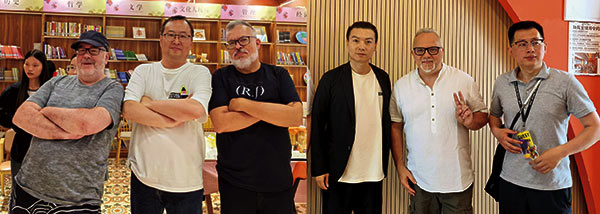
But soon we had to get to work. Not only did we have to give talks to the general student population, we had to teach! Mini-holiday over, we headed off to Qijiang to meet our new students. Plus, Fabio finally showed up! The campus, deep in the Sichuan countryside, was literally being built around us. Not only was the brand-new campus still under construction, but the brand new workshop itself needed last minute fixes. The structure was there but there were so many unknowns that we had not foreseen, for example, the missing faculty had to be replaced by Chinese writers. But more important was making adjustments for the cultural differences. Would the students accept the workshop method of constructive criticism based on close reading? Would they feel free to voice frank opinions to strangers both from China and abroad? And most important, how difficult would it be for the faculty and students to vault over the language barrier?
We were looked after by He Rui, dean of the Yingzhou Science Fiction Academy, who hosted the workshop and made sure everything went well! On arrival, we met not only our students but also our distinguished Chinese colleagues, including A Que, Zhang Ran, Count E, You Zhe and Duan Ziqi. Lavie was delighted to meet old friends, too. Professor Wu Yan, the doyen of Chinese SF, came from Shenzhen to take part in the opening ceremony, having been instrumental in inspiring and encouraging Francesco and Fan on this unique undertaking. And the author Yang Ping came from Shandong to help us teachthe workshop. Lavie first met both Wu Yan and Yang Ping some 24 years ago on his first visit to China, and there was a lot of joy in being able to sit together again and reflect on how much has changed!
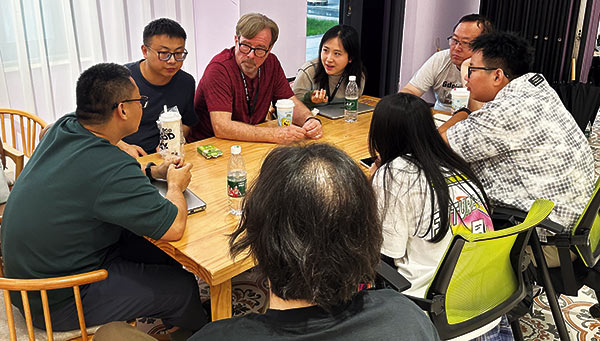
The Chinese teachers were all well-published professionals, intimately familiar with Chinese publishing, many of whom had won the Chinese Nebula and Galaxy awards. While the English of the Chinese, professionals and students, was much better than our nonexistent Mandarin, only about a third were fluent, another third had some proficiency, and another third had none at all. Interpreters were the key, and they had a tough job, especially since they had to translate on the fly during the morning lectures. Two, maybe three, slow sentences from us and then allow for translation was the rule. Jim vividly remembers one interpreter’s look of panic when he got carried away making a point and rattled on for a whole paragraph! One tool we used to bridge the language gap was the app WeChat, which everyone in China uses to message one another. Using its translation function, we never achieved eloquence but managed to communicate effectively with one another and the workshop in general. In the afternoon, the students were divided into five critique groups, each with a writer and a dedicated interpreter. These unsung heroes were a key to the workshop’s success. In Jim’s group of five, for instance, Shiyu Wan interpreted not only the discussion but translated all of the submitted stories so that Jim could consider complete works. And yes, the students did rise to the occasion, asking smart questions of one another (and us) and offering candid and insightful commentary about plot, character and theme. The students met in the evening with the Chinese professionals for additional input about the submissions. The students were on the young side, compared to a class of Clarion or an MFA program, with many of them undergrads. Unlike most Western workshops, there was no fee for attending. The students paid only for transportation to Qijiang and accommodations while there. They were all very enthusiastic about science fiction and eager to engage with workshop culture. One surprising thing was their abiding interest in cyberpunk, although upon close scrutiny, their take on it is an interesting mix of 80s retro and Chinese fantasy tropes. Francesco made a heroic effort to promote solarpunk – which was certainly inspiring!
We also had some time to hang out with our volunteer students, who practiced their English on us and showed us around the campus; eat several times at a great hot pot restaurant – and even play a little pool! Lavie and Ian even ended up in a student bar one night, where their rendition of Oasis’s Don’t Look Back in Anger has no doubt made them TikTok stars. But for the rest of the time we did work hard – honest!
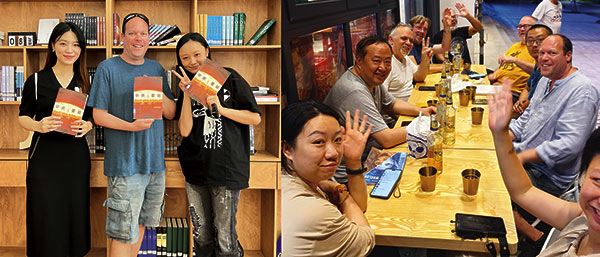
Several prominent visitors came near the end of the workshop to talk to the students. They included publishers from Citic Group and Chongqing Publishing House; the editor of SF World Magazine, Yao Haijun, who many years ago published China’s first-ever fanzine; and the prominent author and futurist Chen Qiufan. Over coffee one afternoon, one publisher of a line of high-end novels hinted that while they were open and eager for western SF, novels centered on the US and its many issues might be hard to sell to Chinese readers. But after eight days of intensive discussion, the workshop ended with the closing awards ceremony. In addition to granting all 25 students certificates of attendance, the organizers decided to recognize the top seven stories with cash prizes, much to the astonishment of the Western writers! While we were divided on the need for such a lavish reward (the winners of which we had to select together with our colleagues), the look on some of our young students’ faces certainly showed their joy – and Jim is too modest to mention he also won Best Teacher! Yes, we were all put to the test ourselves.
While there were the obvious teething problems, and a general need for flexibility as we were essentially working out the workshop itself on the fly, the general opinion of students, faculty and administrators was that the workshop was a success despite the difficulties, and approval has been given to have another in 2025. The next Future Fiction workshop should take place in Shandong Province next year, with Vandana Singh and Lavanya Lakshminarayan hopefully in attendance this time. What shape it will take remains to be seen, but based on our inaugural experience, it is sure to be unforgettable!
–Lavie Tidhar & James Patrick Kelly
This report and more like it in the September 2024 issue of Locus..
 While you are here, please take a moment to support Locus with a one-time or recurring donation. We rely on reader donations to keep the magazine and site going, and would like to keep the site paywall free, but WE NEED YOUR FINANCIAL SUPPORT to continue quality coverage of the science fiction and fantasy field.
While you are here, please take a moment to support Locus with a one-time or recurring donation. We rely on reader donations to keep the magazine and site going, and would like to keep the site paywall free, but WE NEED YOUR FINANCIAL SUPPORT to continue quality coverage of the science fiction and fantasy field.




